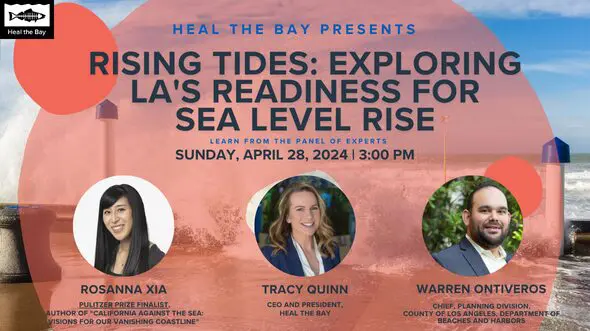Huell Howser: A Host with a Heart of Gold
About UsCalifornia Bag BanCalifornia SharksLong Beach / AvalonMalibu / Pacific PalisadesMarina del Rey / Playa del ReyNewsPalos Verdes PeninsulaSanta MonicaSouth BayVenice Beach
Veteran TV broadcaster Huell Howser passed away Sunday night. Here Communications Director Matthew King remembers his work with Heal the Bay.
If anyone could make plastic bags come alive, it’d be Huell Howser.
As Heal the Bay’s newly hired Communications Director six years ago, I’d been grappling with how to engage the public about the environmental costs associated with society’s addiction to single-use plastic bags. I’d sent out press releases, assembled fact sheets and written earnest letters to the editors about Los Angeles County’s proposed bag ban. But something was missing. We needed some human interest.
So I sent a long email to Huell suggesting that California’s Gold spend a day on the beach taking an up-close look at what plastics were doing to our shorelines. To my surprise, he responded positively and quickly to my pitch. I’ve placed several Op Eds in the L.A Times and successfully arranged dozens of segments on local TV news programs since then, but Huell calling me back that afternoon and coordinating the filming schedule marked one of my greatest professional moments here.
Media relations professionals often lose perspective about the issues they pitch. Self-doubt naturally creeps in when success hinges on the mercurial interests of overworked journalists. Is this topic compelling to most people? Does anyone really care about this?
Huell served as bit of a gold standard. He had made a career of mining the profound in the mundane. So if he found plastic bags interesting, then by default they were interesting.
On the drive down the 405 freeway to the Manhattan Beach Pier, my colleague Kirsten James and I did our best Huell impersonations. I made a bet with Kirsten that I could get Huell to drawl the amount of plastic bags we use each year in L.A. County in dragged-out astonishment. “Noooooo, Kirsten! NINE BILL-YUN plastic bags??!!” I won my bet.
Huell became a bit of a caricature to some jaded members of L.A.’s media community, with his beefy biceps and cornpone demeanor. But that sunny afternoon in the South Bay proved to me that his TV personality wasn’t some calculated act. Off camera, he bubbled with the same Southern charm and decency as shown on screen. It could’ve been model trains or an old mill, but on this day plastic bags inspired that sense of wonder and incredulity that marked his best work.
Huell never proselytized about environmental protection, letting the sheer beauty of California’s special places speak for itself. Before you can expect people to act, you have to inspire. And inspire he did. For that, environmental organizations up and down the state owe Huell a debt of gratitude.
In subsequent years, I’d occasionally suggest other ideas to Huell: looking for great white sharks in Santa Monica Bay or exploring Compton Creek. He didn’t take the bait, but he always made a point of calling me back personally to tell me why. Most journalists don’t respond to pitches, no matter how well-crafted and personalized, either by phone or email. You get used to the rejection, but it still grates. It’s a simple thing, but Huell’s calls showed class and consideration. He didn’t have to telephone, but he did.
My last phone call from Huell came a few months ago, declining an invitation to attend a Heal the Bay event in Santa Monica celebrating African-American surf culture in Southern California. He wanted to attend, he said, but would be traveling. As we chatted on a fading Friday afternoon, he seemed a bit tired. I said goodbye and wished him well.
Huell will be remembered as the champion of the obscure. But I think of him celebrating the essential: to be kind, to be curious, to be connected. California will miss him.



